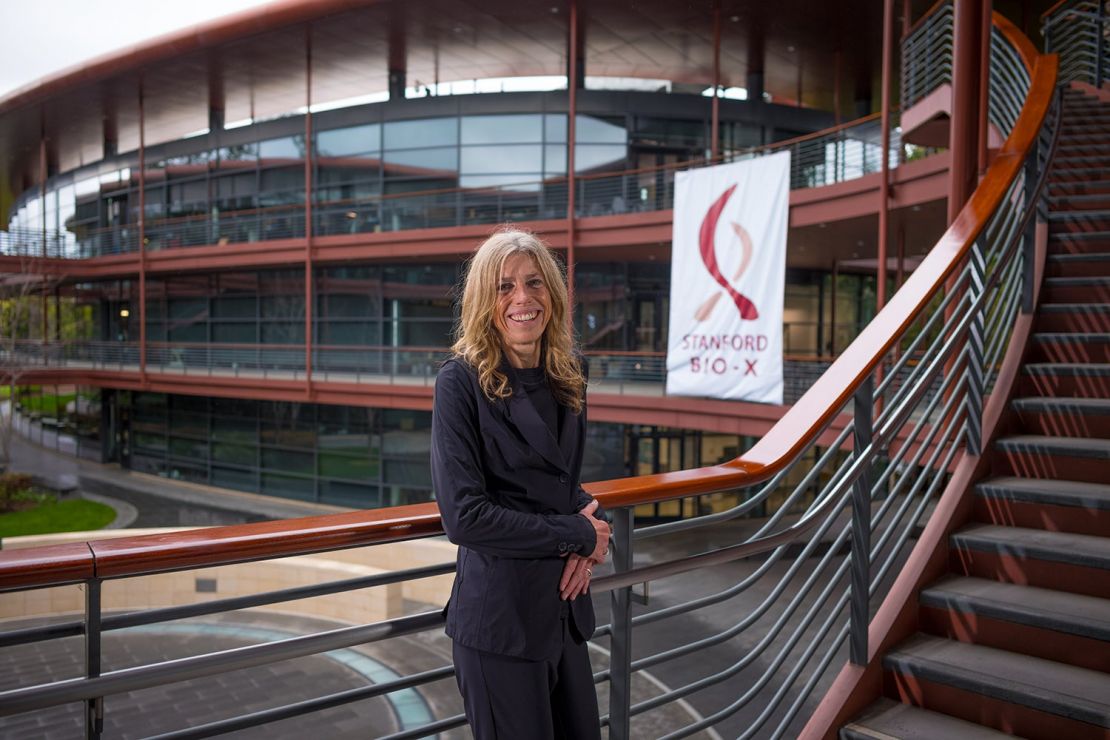
Ellen Kuhl, the Walter B. Reinhold Professor in the School of Engineering and Robert Bosch Chair of Mechanical Engineering will assume directorship of Bio-X on Sept. 1. (Image credit: Aaron Kehoe)
Stanford Professor Ellen Kuhl will become the next director of Stanford Bio-X, an institute under the vice provost and dean of research. Kuhl, the Walter B. Reinhold Professor in the School of Engineering and currently the Robert Bosch Chair of Mechanical Engineering, will begin her term on Sept. 1, 2024, as the Catherine Holman Johnson Director of Stanford Bio-X.
“Ellen Kuhl is a superb researcher whose work fuses basic science with computational methods to develop technologies capable of advancing human and environmental health,” said David Studdert, vice provost and dean of research. “She is also a highly respected leader and has been an active contributor within the Bio-X community for over a decade. Ellen is an ideal person to build on the excellence in research, training, and collaboration that Carla Shatz has cultivated in Bio-X over many years of tremendous leadership.”
Shatz will step down from the role on Aug. 31, 2024, after leading Bio-X’s growth for 17 years. Today, the institute links over 1,300 faculty from 75 departments across Stanford’s seven schools. The institute trains students at all levels, catalyzes interdisciplinary research in biological systems across campus, and generates new knowledge for the benefit of human health.
“I am delighted that Ellen has agreed to take the helm next September. Her vision, energy, and expertise bring an exciting perspective to Stanford Bio-X,” said Shatz, director of Stanford Bio-X, and the Sapp Family Provostial Professor, and professor of biology and of neurobiology. “She will continue to build on the amazing community and collaborative spirit that has made my experience so rewarding and meaningful.”
The search committee, chaired by Professor Markus Covert, engaged widely with the Bio-X community and beyond. They elicited ideas on the institute’s future, as well as the leadership and academic characteristics the next director should have. The committee then recommended candidates to Studdert, who made the appointment in consultation with the provost and deans of the School of Humanities and Sciences, School of Engineering, School of Medicine, and the Stanford Doerr School of Sustainability.
“The groundbreaking science and innovative discoveries of our Bio-X community are globally recognized, and Bio-X research is at the forefront of producing new knowledge and scholarship,” said Kuhl. “I am grateful for the strong foundation that Carla Shatz has laid, and I look forward to leading the Bio-X community in fostering innovation, supporting collaboration, providing resources, accelerating growth, and nurturing groundbreaking bio-related programs to fruition.”
A passionate, innovative, and experienced interdisciplinary leader
Since joining the faculty in 2007, Kuhl’s research in the Living Matter lab has transformed the design of theoretical and computational models to simulate and predict the behavior of living systems. Her research group has integrated machine learning and artificial intelligence with physical principles to design computational models that provide new insights into heart failure, COVID-19, brain development, and neurodegeneration.
“I have personally benefited from the unique multidisciplinary and collaborative spirit of Bio-X, which has inspired me in many ways for over a decade,” continued Kuhl. “I’m thrilled to serve as the next Bio-X director and help catalyze innovative solutions to the challenges we face as a society today. Bio-X is an intellectual powerhouse with the ability to incubate and launch new ideas and groundbreaking discoveries for the benefit of human and environmental health. I will work in close partnership with our schools and Stanford’s independent labs, institutes, and centers to connect the bright minds across our campus to achieve these goals.”
Kuhl is a founding member of the Living Heart Project, a translational research initiative aimed at revolutionizing cardiovascular science through realistic simulation with global reach and participants from research, industry, and medicine. At Stanford, she has led strategic planning initiatives to reimagine mechanical engineering with a focus on robotics, human health, and the environment. With a deep passion for education and scholarship, Kuhl has helped launch making@stanford, a campus-wide program housed in the School of Engineering and aimed at providing every Stanford undergraduate with experiences in design, manufacturing, and making. Kuhl is the current chair of the U.S. National Committee on Biomechanics and a member-elect of the World Council of Biomechanics. She received her PhD from the University of Stuttgart in 2000 and her Habilitation from the University of Kaiserslautern in 2004.
Commemorating 25 years of interdisciplinary research
Since 1998, Bio-X has helped facilitate interdisciplinary research in biomedical and life sciences. Crossing the boundaries of disciplines, departments, programs, and schools, Bio-X faculty, postdocs, and students pursue high-risk, uncharted, yet essential research collaborations.
In addition to interactive lab space at the James H. Clark Center, Bio-X provides critical resources – seed grants, graduate fellowships, undergraduate summer research opportunities, and venture funds – to drive early-stage research and train a new generation of researchers. Bio-X incubates experimental ideas from across disciplines and has connected groundbreaking ideas through 252 seed grants, uniting 1,000+ faculty members, 570 post-doctoral scientists, 955 graduate students, and more than 1,000 undergraduates.
Recently, Bio-X commemorated its 25th anniversary, celebrating the institute’s achievements, global impact, and countless success stories. Bio-X’s enduring collaborative culture has become home to those inspired to pursue excellence in research and education.